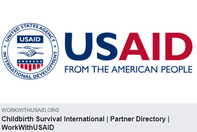 "I am currently leading and mentoring our country's next generation of nurses and midwives through CSI. We are having a project at the lake region, Mara and also in Biharamulo, Kegera. We are working towards improving maternal mortality at the grass root level by educating mothers because that is where the problem is so we link them with health centers. It happens that hospitals wait for patients to come but research has shown that over 50 percent of pregnant women deliver at home," she speaks, and continues, "This is the 21st century, it is not that they don't understand that they are supposed to go to the hospital, they do but there are a number of reasons that hinder them to do so like tradition for instance." However, despite all the enjoyment she had while teaching others and as she continues doing so, one thing that she is proud of is the fact that her teachings impart knowledge and professionalism. She noted that there has been an issue of professionalism among health workers to the point that someone sees a nurse and asks him\herself is this really a nurse? "I am not sure if it's a global problem or just a problem here in Tanzanian but my experience shows that there is a problem somewhere because when I say professionalism I mean ethical conduct; the behaviour or attitude. Dealing with another human being, one needs to show respect and really care. If you don't have those you cannot call yourself a qualified nurse or a doctor," narrates Mpanda. Read full article here.
0 Comments
 I was born in Canada, the only child in a “working class” family. Growing up, I had a strong example of gender equality in my family home. My father did jobs around the house that might traditionally be called “women’s work:” he cooked and cleaned and washed the clothes. With his support, I received the University education that had been unaffordable for himself. He taught me I could achieve anything I wanted, and to cherish my independence. It is painful to see that life for girls in Sub-Saharan Africa is dramatically different. Too often, girls are forced to leave school for reasons unique to their female bodies: namely, menstruation & pregnancy. The overwhelming subordination of girls and women makes them vulnerable to a number of situations that result in unintended teen pregnancies. Among these are the sexual expectations of older men, including their teachers, as well as those of male classmates. Sex with older men who seem able to provide protection and support is also one of the few sources of income available to adolescent girls who cannot otherwise provide for themselves: the so-called “sugar daddy” culture is common. Some estimates indicate that as many as 10% of girls in Africa drop out of school due to menstruation. School toileting facilities are unhygienic and lack privacy, making it impossible for girls to discretely manage their menses. Many girls also lack adequate feminine hygiene products: the most commonly used items include reusable menstrual cloths made from scraps of shirts, dresses, old towels, or blankets. Attending school becomes fraught with anxiety, as girls worry about leakages staining their clothes, the visibility of menstrual cloths through their school uniforms, and odour. Rather than risk embarrassment they stay home, falling farther and farther behind in their studies, until it no longer seems worthwhile to attend school at all. Finding a way to keep girls in school, however, may be the single best way to address the poverty and disease affecting Sub-Saharan Africa. A wealth of research confirms that girls who complete primary and secondary education marry later, have smaller families, and earn higher wages. As well, the prevalence of HIV/AIDS among educated women is significantly lower than among those with no education. A mother’s education improves her child’s nutrition, and makes her less likely to die in childbirth. Finally, children of educated women are more likely to go to school, which has a ripple-out effect on education for future generations. But beyond the economic, social and health benefits is an even more important reason to keep Africa’s girl-child in school – education is, after all, her basic human right. Without a doubt, sexual health and menstrual hygiene management education is critical to addressing the factors that cause girls to drop out of school. Many teachers are often unwilling to teach these topics, however, due to their own embarrassment and gender biases. That’s why programs like CSI’s Girl Talk, Girl Power are so important – by taking on the taboo subjects and “telling it like it is” to Africa’s girl-child, they fill perhaps the most critical gap in their education. By Karen Glen, CSI Grant Writer  I am an OBGYN in private practice for almost 40 years. My first experience to see maternal mortality was when I was ten years old in India. My two neighbors died in childbirth -- one was 19 years old pregnant with her first baby and she died of pre-eclampsia and the other died after her third delivery with hypertension and renal failure. Prenatal care is about the well-being of both mother and baby and it starts with mother being in good health followed with pre-conception counseling and a series of appointments leading to childbirth. Every woman has a right to be taken care of and protected during her pregnancy so she can raise her children. She should get help in seeing the healthcare provider for her checkups, get help with adequate nutrition and checked for any complications during pregnancy that can cause adverse effect to her and her unborn child. Her safety at home, abusive situations and exposure to infections should be monitored. A woman who has medical problems should be screened so she does not lose her life through pregnancy. Pregnancy termination and contraception are to be offered to her and education on these subjects is important. If it is socially unacceptable then her partner and family should be involved in counseling. Today we have many tools for educating girls and women to decide when they get married, have sex and get pregnant. It is a choice unlike in the past where it was not a choice. Maternal mortality is tragic and most of the time reflects on a society that is not being responsible or responsive to the need for proper prenatal care. By Dr. Usha Varma, Denver, Colorado |

 RSS Feed
RSS Feed




